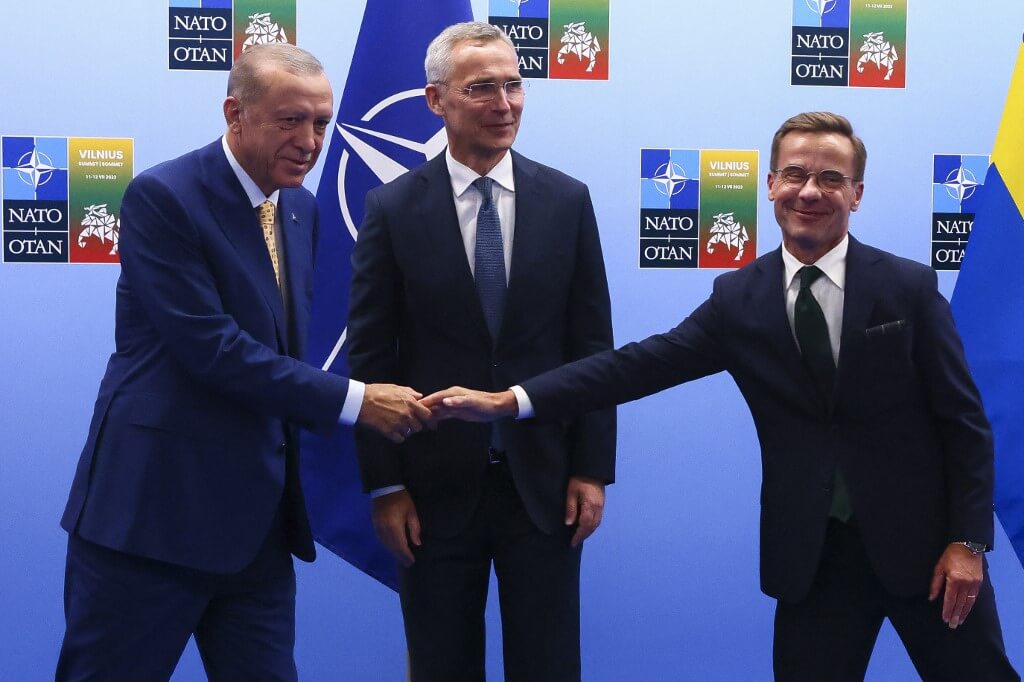Fatih Yurtsever*
While Turkish President Recep Tayyip Erdoğan’s last-minute decision to support Sweden’s NATO membership has become a focal point in Turkish public discourse, the decisions made at the NATO summit in Vilnius July 11-12 hold profound implications for Turkey’s foreign policy in the near future.
President Erdoğan’s close personal relationship with Russian President Vladimir Putin, along with the circumstances following Russia’s invasion of Ukraine on Feb. 24, 2022 has resulted in a firm economic and political alliance between Turkey and Russia. This partnership’s significance is evidenced by the rise in Turkish exports to Russia, from $2.6 billion in the first half of the previous year to $4.9 billion in the corresponding period of this year, post the invasion of Ukraine. Concurrently, Turkey’s imports of Russian oil have sharply escalated. This economic boon chiefly arises from Turkey’s decision not to endorse Western sanctions against Russia.
Following a runoff election on May 28, 2023, the question of how Erdogan, the re-elected president of the republic, would shape Turkish foreign policy emerged as a critical concern in Moscow and Western capitals.
The change in Erdoğan’s stance on Sweden’s NATO membership, announced at the Vilnius summit, serves as a vital indicator of the potential trajectory of Turkey’s foreign policy. President Erdoğan agreed to support Sweden’s alliance membership after discussions with Sweden’s prime minister, Ulf Kristersson, and NATO Secretary General Jens Stoltenberg. The statement issued post-trilateral talks highlighted that “Sweden will actively support efforts to rejuvenate Turkey’s EU accession process, including modernizing the EU-Turkey Customs Union and visa liberalization.”
Erdoğan’s call for the EU to restart the accession process has been widely interpreted in both Turkish and international media as a considerable shift away from Russia, towards alignment with the EU and NATO. This situation necessitates careful consideration of several nuances. Firstly, Turkish-Russian relations are founded on interdependence, suggesting that Russia possesses an in-depth understanding of Turkey’s strengths and limitations as a NATO member. Therefore, Erdogan’s support for Sweden’s NATO membership wouldn’t have caught Russia off guard. As Kremlin spokesperson Dimitri Peskov stated on Tuesday, “This has never been a secret for us. We have never worn rose-tinted glasses in this regard.”
Secondly, Russia is also well aware of the EU’s stance on Turkey’s EU membership ambitions. A June analysis by Brad W. Setser of the Council on Foreign Relations titled “Turkey’s Increasing Balance Sheet Risks” succinctly captured the essence of the situation: Erdoğan has secured re-election but now faces the daunting task of avoiding an impending financial crisis. The crux of the issue lies in Turkey’s imminent depletion of usable foreign exchange reserves, presenting the country with challenging choices: sell its gold reserves, face a preventable default, or brace for the harsh reality of a total policy reversal, potentially encompassing an IMF program. Considering Turkey’s economic predicament, Russia is likely to interpret Erdogan’s overtures to the EU as a strategic move aimed at securing financial aid amid Turkey’s current economic turmoil.
However, some points in the Vilnius communiqué may compel Turkey to make some challenging decisions concerning Russia and Iran. Item 79 of the declaration reads: “The Black Sea region is of strategic importance for the Alliance. This is further highlighted by Russia’s war of aggression against Ukraine. We underline our continued support to Allied regional efforts aimed at upholding security, safety, stability, and freedom of navigation in the Black Sea region including, as appropriate, through the 1936 Montreux Convention. We will further monitor and assess developments in the region and enhance our situational awareness, with a particular focus on the threats to our security and potential opportunities for closer cooperation with our partners in the region, as appropriate.”
Turkey has traditionally resisted a substantial NATO presence in the Black Sea, especially one involving deploying warships that could potentially antagonize Russia. It has argued that security in the Black Sea should be the prerogative of the littoral states alone, asserting that any external intervention could jeopardize its security in the region. Moreover, Turkey has interpreted the Montreux Convention’s provisions concerning the passage of non-littoral warships through the straits in a way that avoids provoking Russia. Nonetheless, as suggested in this article, it may become increasingly challenging for Turkey to maintain this policy. A shift in Turkey’s Black Sea policy favoring NATO’s interests could potentially precipitate a crisis in Turkish-Russian relations.
Another point of contention that could lead to a crisis between Turkey and Russia in the near future concerns Iran.
The deepening of Russian-Iranian relations, marked by Iran’s assistance in helping Russia circumvent sanctions during the Russia-Ukraine crisis and its sale of unmanned aerial vehicles to Russia, has propelled their relationship to a strategic level. However, members expressed clear concerns about Iran’s nuclear program for the first time at the NATO summit. The statement “We reiterate our clear determination that Iran must never develop a nuclear weapon. We remain deeply concerned about Iran’s escalation of its nuclear program. We call on Iran to fulfill its legal obligations under its Non-Proliferation Treaty-required safeguards agreement and political commitments regarding nuclear non-proliferation without further delay …” demonstrates NATO’s discomfort with this relationship. The US and Israel could use this clause to initiate a limited air operation against Iran. Turkey’s reaction to such an operation could instigate a crisis with Russia and Iran.
In conclusion, the Vilnius Summit Communiqué offers valuable insight into the shifting dynamics of global politics and NATO’s ability to adapt to these changes. Specifically, NATO’s positions on the Black Sea and Iran may compel Turkey to make difficult foreign policy decisions involving Russia and Iran in the near future.
* Fatih Yurtsever is a former naval officer in the Turkish Armed Forces. He is using a pseudonym out of security concerns.



